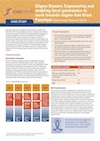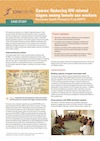




This series of five case studies is based on research to adapt and test a global HIV stigma reduction framework in India. The research was led by STRIVE partner ICRW with funding from UNDP. Each case study focuses on the implementation of stigma-reduction activities in partnership with local organisations and populations.
Local government
Stigma Busters: Empowering and enabling local governance to work towards stigma-free Gram Panchyat
The potential for Panchayat Raj Institutions (PRIs), India’s local governing bodies, to influence HIV-related stigma among communities has not been utilized. This project was successful in training and mobilizing Gram Panchayat (GP) members to lead stigma reduction efforts in five communities. Working with Swasti Health Resource Centre, it created a platform for ongoing dialogue between the Panchayat and PLHIV.
Industry
Protecting the rights of people living with HIV in the workplace
The Gujarat State Network of Positive People (GSNP+) set out to learn more about the employment needs of people living with HIV. In order to create a supportive and non-discriminatory work environment for PLHIV, this project explored the drivers and facilitators of stigma among both workers (general population) and institutions (senior management and policies).
Sex worker collectives
Gaurav: Reducing HIV-related stigma among female sex workers
HIV-positive sex workers face intersecting stigmas that impede their health and livelihood options. Working with STRIVE partner Karnataka Health Promotion Trust (KHPT) on a community-based participatory approach, this project aimed to improve the quality of life of HIV-positive female sex workers (FSWs) by addressing discrimination and marginalisation.
Education
Integrating a youth-based stigma and discrimination reduction curriculum in higher education
Stigmatizing attitudes towards people living with HIV (PLHIV) are common among young people. This intervention addressed young people’s social judgments, fear of infection through casual contact and lack of awareness of stigma and its harmful consequences. Working with with St Xavier’s College, this project demonstrated that higher education can be an effective entry point for stigma reduction.
Health care providers
Reducing stigma to improve engagement in HIV care among men who have sex with men
Men who have sex with men (MSM) experience multi-layered stigma and discrimination as a result of their same-sex behaviour and their perceived or real HIV status. Internalised self-stigma combined with enacted or perceived stigma by health care providers can prevent MSM from accessing health services. Working through a process of research and joint discussion of findings with the Humsafar Trust, this project created a foundation for combating stigma at both the individual and institutional levels.
Download all five case studies as a combined PDF here.
Download ICRW's summary report on the global HIV stigma reduction framework in India here.
Read more about ICRW's guidelines for reducing HIV stigma in India in Projects.



